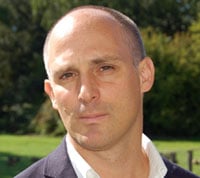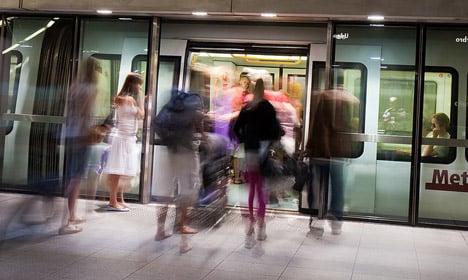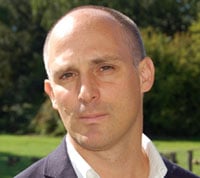 Michael Booth is the author of The Almost Nearly Perfect People: The Truth About the Nordic Miracle available now on Amazon and is a regular contributor to publications including the Guardian and Monocle
Michael Booth is the author of The Almost Nearly Perfect People: The Truth About the Nordic Miracle available now on Amazon and is a regular contributor to publications including the Guardian and MonocleBOOTH
What does it mean to be famous in Denmark?
Columnist Michael Booth says that in a country as small as Denmark, everyone seems to have a connection to a 'famous' person but very few Danish 'celebrities' have any pull (or earning power) beyond our small borders.
Published: 11 November 2014 09:03 CET

TV personality Linse Kessler. Photo: TV3
Yeah, so I know a few famous people. Get over it.
I should fess up: all the ‘famous’ people I know tend to be Danish. When I say ‘tend to be’, I mean ‘are’. I don’t think that time when Alan Rickman asked me to get out of his way on Regent Street counts towards acquaintance status.
Actually, the Danishness of these famous friends of mine has lead me to question the very meaning of the word ‘fame’. What does it mean to be famous in a country of five million?
Take one of my friends – a TV host – for example. She is properly, massively famous here, everyone knows and loves her, but the moment she steps across the border to Sweden or Germany, she is a nobody, like me. Is she famous?
In contrast, someone else I know, also a Dane, has been on the cover of Time magazine. Twice. Now, that’s proper fame, surely? On the other hand, he could probably walk down the street in Slagelse and no one would recognise him. So he’s kind of not famous in Denmark either.
In theory, it doesn’t take much to make a name for yourself in this country. To glance at the pages of those crappy TV listings or royal rags they sell at the checkouts here in Denmark is to be confronted with a barrel’s bottom of fake-breasted nobodies, fake-tanned mediocrities, talent show rejects and minor royals (or their unfortunate brides, neither of whom ever had any talent to reject in the first place, not that I begrudge them a single kroner of my tax money…). They are in the ‘Kendt’ pages so they must be famous, no matter that all they’ve done is attract a few thousand to their Facebook page, or slept with a member of Duran Duran. No wonder that at film premieres or other ‘VIP’ events in Copenhagen it can often seem that the red carpets are more crowded than the spaces beyond the barriers.
Danish fame is rendered even less meaningful in a country where it often seems like everyone knows each other. You are familiar with the concept of Six Degrees of Separation whereby everyone in the world can be connected via six personal acquaintances, or being Kevin Bacon's co-stars? In Denmark, at least according to my own empirical observation, the degree of separation is three at most.
When two Danes meet for the first time at a party, it takes them no longer than eight minutes to discover they have a mutual acquaintance, often much less. I’ve timed it.
In other words, everyone is kind of famous, to a certain extent, in the sense that most people have heard of each other. That works in terms of the properly famous, too. Everyone seems to know someone who lives in the same street as Helle Thorning-Schmidt, for instance (a friend of mine who actually is a neighbour of hers tells a lovely story about the PM calling her husband in for dinner, as if he were a child playing in the street), or their cousin went to school with Casper Christensen, or whatever. Thus are the ‘famous’ rendered somehow ordinary.
It doesn’t help that Danish fame rarely brings the ‘enough to last the rest of your life’ levels of wealth that can be its reward in other countries. With a handful of exceptions – a couple of the footballers, the members of Aqua – even the most famous of Danes probably doesn’t earn much more than an averagely successful Mærsk executive (which still isn’t bad, but it sure ain’t Streisand).
I was listening to a discussion on the radio the other day about the impact this has on famous Danes’ earning power. “Whenever I see someone famous from Denmark endorsing a product, I cringe a bit,” one of the guests said. “You always think, ‘Oh, have they just got divorced, or are they short of cash?’ Famous Danes don’t have the option of going to Japan to earn some money selling products.”
I am not expecting anyone to feel sorry for domestically famous Danes, but fame in this country does seem to be a very peculiar form of poisoned chalice: all the irritants of fame, without the financial benefits.
Almost makes you feel sorry for Linse Kessler. (What do you mean you've never heard of Linse Kessler?)
 Michael Booth is the author of The Almost Nearly Perfect People: The Truth About the Nordic Miracle available now on Amazon and is a regular contributor to publications including the Guardian and Monocle
Michael Booth is the author of The Almost Nearly Perfect People: The Truth About the Nordic Miracle available now on Amazon and is a regular contributor to publications including the Guardian and Monocle
Url copied to clipboard!


 Michael Booth is the author of The Almost Nearly Perfect People: The Truth About the Nordic Miracle available now on
Michael Booth is the author of The Almost Nearly Perfect People: The Truth About the Nordic Miracle available now on  Please whitelist us to continue reading.
Please whitelist us to continue reading.
Member comments